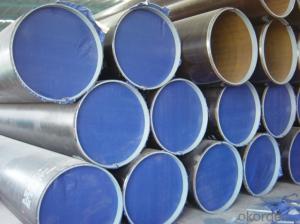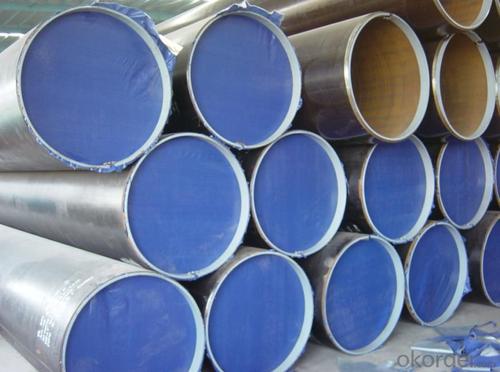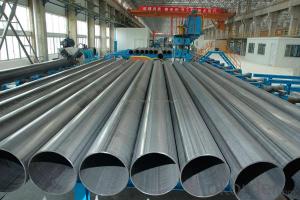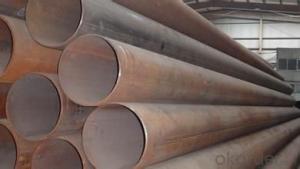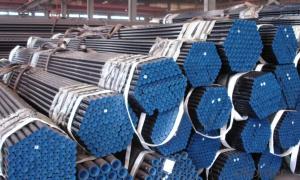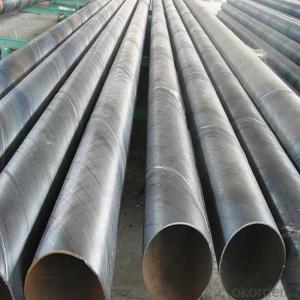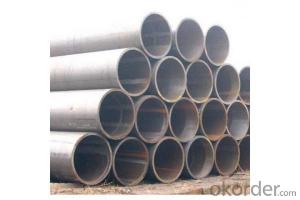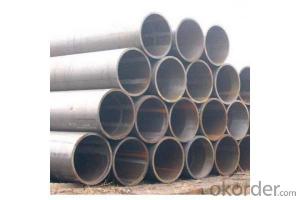CARBON STEEL LSAW PIPE
- Loading Port:
- China Main Port
- Payment Terms:
- TT OR LC
- Min Order Qty:
- -
- Supply Capability:
- -
OKorder Service Pledge
OKorder Financial Service
You Might Also Like
LSAW Steel Pipe
1 Size: 219-3200 mm*5-25.4mm
2 Material Q235/Q345/20#/X42-X65/J55 etc
Standard:
EN-10208-1/2, GB9711.1/2 etc.
Steel Grade:
B, X42 up to X70; L245, L290 up to L48
Usage:
Used for Steel Structure
Size:
LSAW from 219.1mm to 3200mm, thickness from 5mm to 25.4mm
Ends: Beveled ends with protector
Surface:
Bare / Varnish coating / FBE, 3PE coating DIN30670 / or by client option
Packing:
Casing, bundled shipping in containers or by break bulk vessel
Process | Longitudinal Submerged- Arc Welded Steel Pipe (DSAW -Double Submerged arc welded) |
Usage | Used for liquid delivery, such as water, gas, and oil; construction and piling |
Standard | API 5L(PSL1,PSL2), ASTM A252,EN10217, EN10219,KS F4602, KS D3583, BS, JIS, IS |
Certificate | ISO 9001:2008, ISO 14001, ISO 18001, API 5L (PSL1, PSL2),EN10217, EN10219 and so on. |
Outside Diameter | 323.9 mm-2134 mm (12"-84") |
Wall Thickness | 6 mm - 80mm |
Length | 6 – 14 m |
Grade | API 5L: GR A, GR B, X42,X46, X56, X60,X65,X70 ASTM A252 GR 1, GR 2, GR 3 EN 10219: S275, S275JR, S355JRH, S355J2H EN 10224, L235,L275,L355 |
Surface | Fusion bond Epoxy coating, Coal Tar Epoxy, 3PE, Varnish Coating, Bitumen Coating, Black Oil coating as per customer’s requirement |
Test | Chemical Component Analysis, Mechanical Properties (Tensile strength, Yield strength, Elongation), Hydrostatic Test, X-ray Test,Size Inspection. |
Mill Test Certificate | Mill Test Certificate:EN 10204/3.1B |
- Q: Can steel pipes be used for underground irrigation systems?
- Certainly, underground irrigation systems can indeed utilize steel pipes. Steel pipes have gained popularity for irrigation systems owing to their exceptional durability, strength, and corrosion resistance. They have the capability to endure the immense pressure and stress associated with being buried underground, thus ensuring longevity without the need for frequent maintenance or replacement. Moreover, the smooth interior surface of steel pipes enables efficient water flow and minimizes the risk of clogging. Additionally, steel pipes are readily available in a variety of sizes and can be easily customized to meet specific requirements of irrigation systems. However, it is crucial to ensure that the steel pipes employed for underground irrigation systems are adequately coated or treated to prevent corrosion and extend their lifespan.
- Q: What time what time for gas pipeline steel pipe PE pipe
- PE pipe must be installed underground, the steel tube can be exposed, when not all PE pipe for pipe laying, overhead installation. But the steel tube is easy to rust, so it can be used where the basic use of PE pipe buried PE pipe.There are galvanized steel pipe and seamless steel pipe, galvanized pipe can only be used for low-pressure homes
- Q: Can steel pipes be used for transporting liquids?
- Yes, steel pipes can be used for transporting liquids. Steel pipes are commonly used in various industries, including oil and gas, water supply, and sewage systems, due to their durability, strength, and resistance to corrosion. They are effective for transporting liquids such as water, oil, natural gas, and chemicals over long distances efficiently and safely.
- Q: Are steel pipes resistant to UV radiation?
- Yes, steel pipes are generally resistant to UV radiation. UV radiation is known to cause damage to materials over time, such as fading, discoloration, and degradation. However, steel pipes are typically coated with protective layers, such as paint or galvanization, which help to shield them from UV radiation. These coatings act as a barrier, preventing the direct exposure of steel to UV rays and minimizing the potential for damage. Additionally, the inherent properties of steel, including its strength and durability, make it less susceptible to the effects of UV radiation compared to other materials like plastics or rubber. However, it is important to note that prolonged exposure to intense UV radiation can still have some impact on steel pipes, such as slight discoloration or surface degradation. Regular maintenance and inspection are recommended to ensure the continued performance and longevity of steel pipes in outdoor or UV-exposed environments.
- Q: Can steel pipes be used for underground fuel storage tanks?
- Yes, steel pipes can be used for underground fuel storage tanks. Steel pipes are commonly used for various applications, including underground storage tanks for fuel. They are strong, durable, and resistant to corrosion, making them suitable for long-term storage of fuels such as gasoline, diesel, and oil. Additionally, steel pipes can be easily welded together to create a seamless and secure tank structure. However, it is important to ensure that the steel pipes used for underground fuel storage tanks are properly coated with corrosion-resistant materials to protect them from any potential damage caused by exposure to moisture or the chemicals present in the fuel. Regular inspection and maintenance are also necessary to ensure the integrity of the tank and prevent any leaks or environmental hazards.
- Q: Can steel pipes be used for aboveground applications?
- Steel pipes have the capability to be utilized in aboveground applications. Their strength, durability, and resistance to corrosion are well-known attributes, making them suitable for a variety of aboveground uses. Industries such as construction, oil and gas, water transportation, and infrastructure development often rely on steel pipes. Aboveground applications for steel pipes include structural supports, handrails, fencing, scaffolding, outdoor pipelines, and various other outdoor structures. Furthermore, steel pipes can undergo coating or painting processes to provide additional protection against weather conditions and enhance their aesthetic appearance. All in all, steel pipes offer versatility for aboveground applications due to their dependable nature and long-lasting performance.
- Q: Are steel pipes suitable for pharmaceutical manufacturing facilities?
- Yes, steel pipes are suitable for pharmaceutical manufacturing facilities. Steel pipes are highly durable, resistant to corrosion, and can withstand high temperatures and pressures. They are also easy to clean and maintain, ensuring the integrity and safety of pharmaceutical processes. Additionally, steel pipes are compatible with a wide range of chemicals and pharmaceutical products, making them a reliable choice for pharmaceutical manufacturing facilities.
- Q: What are the different methods of pipe support for steel pipes?
- There are several methods of pipe support for steel pipes, including clamps, hangers, brackets, and guides. Clamps are used to secure pipes to a structure, while hangers suspend the pipes from overhead supports. Brackets provide lateral support and stability, and guides are used to control pipe movement and prevent excessive sagging. These various methods ensure the proper installation and stability of steel pipes in different applications.
- Q: What are the different types of connections used with steel pipes?
- The different types of connections used with steel pipes include threaded connections, welded connections, and flanged connections.
- Q: Can steel pipes be used for heat exchangers?
- Yes, steel pipes can be used for heat exchangers. Steel pipes are commonly used in heat exchangers due to their strength, durability, and excellent thermal conductivity properties. They are capable of withstanding high temperatures and pressures, making them suitable for various industrial applications.
Send your message to us
CARBON STEEL LSAW PIPE
- Loading Port:
- China Main Port
- Payment Terms:
- TT OR LC
- Min Order Qty:
- -
- Supply Capability:
- -
OKorder Service Pledge
OKorder Financial Service
Similar products
Hot products
Hot Searches
Related keywords
